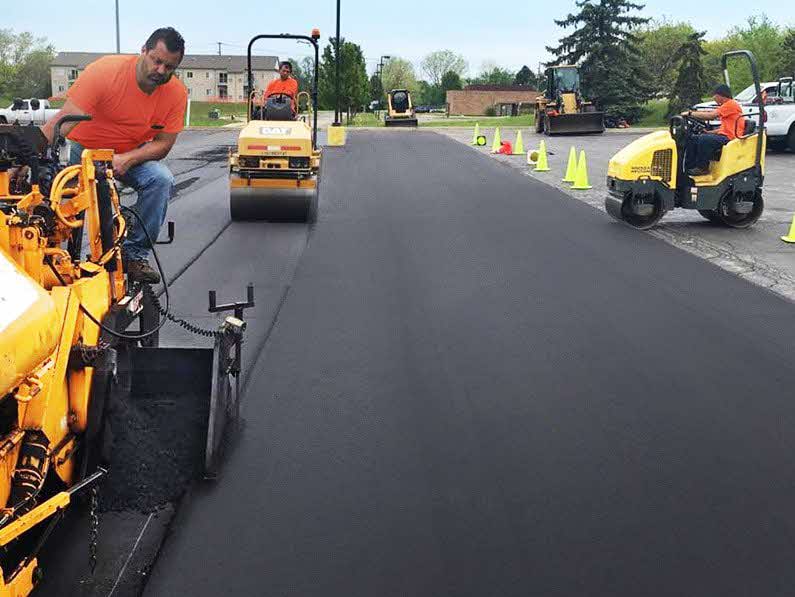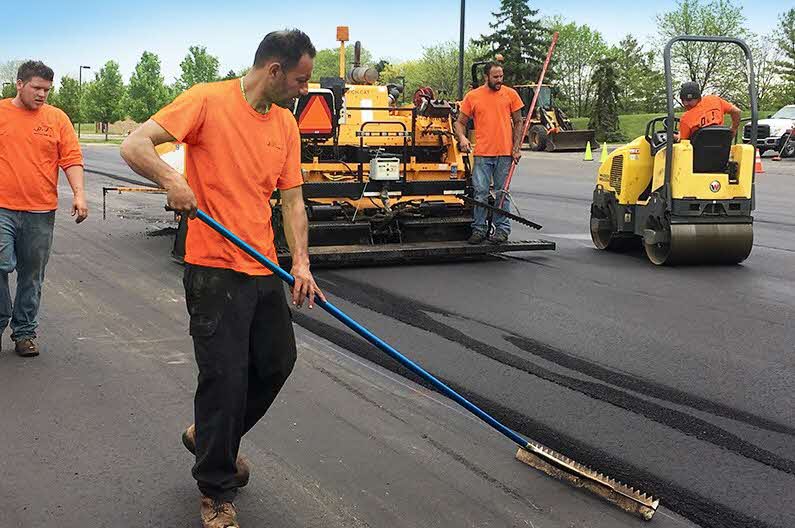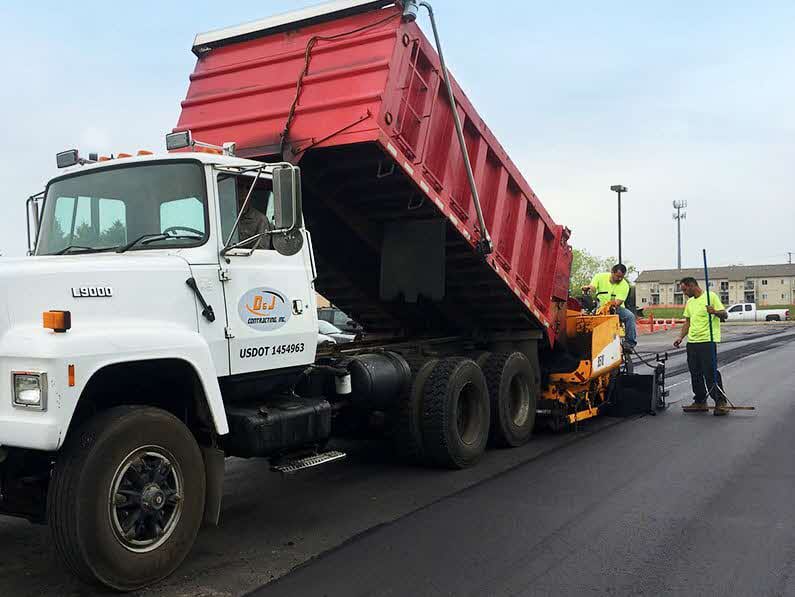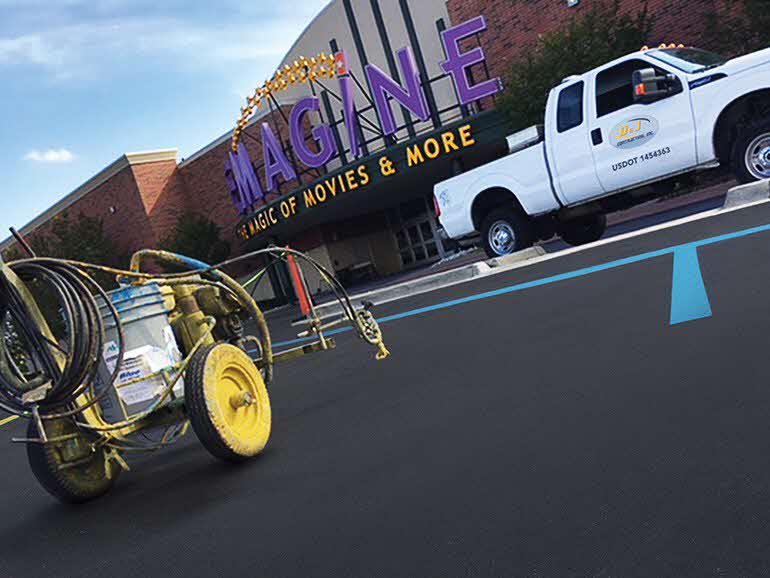Concrete Clinton Township Michigan
We Are Locally Owned
& Operated For 36 Years
Contact Us Today!
About Concrete
An In-Depth Guide to Concrete: The Go-to Material for Commercial Properties
Concrete is undeniably the cornerstone of modern architecture. Showcasing versatility and durability, concrete has consistently been the material of choice in commercial construction projects worldwide. This comprehensive guide delves into the world of concrete, outlining its production process, benefits, and important associated services such as concrete grinding, foundation and finishing. Additionally, we outline considerations when choosing between paving and a concrete driveway for your commercial property.
The Concrete Production Process
Concrete, a composite material, is fundamentally a mix of water, aggregate—comprising gravel and sand—and cement, which acts as a binder. The concrete production process begins with the preparation of the raw materials, followed by their blending in the right proportions. The combined ingredients are then mixed with water to produce a thick, slurry paste. This paste is poured into moulds and allowed to harden into the robust infrastructure material that we know.
Through adjustments in the composition and aggregate size, concrete can be tailored to meet a wide range of specifications. These modifications allow for the creation of concretes with varied densities, strengths and levels of resistance to weather and other external factors. Such versatility makes concrete the favoured choice for numerous applications in commercial properties.
Benefits of Using Concrete in Commercial Properties
Concrete offers an unparalleled blend of longevity, resilience and affordability, making it a viable choice for commercial properties. Its compressive strength makes it perfect for bearing immense loads, especially in high-traffic areas. For the same reason, concrete serves as an exceptional choice for foundational purposes in buildings and structures. Temperature variations and exposure to elements have minimal effect on concrete, thus contributing to its longevity.
Understanding Concrete Services
Various professional services are associated with concrete, each playing a significant role in the overall construction process. These services include concrete grinding, foundation, and finishing, among others.
Concrete Grinding Services
Concrete grinding is a process used to prepare the concrete surface for other applications or to remedy imperfections. It’s crucial in ensuring the concrete surface is smooth and even. Concrete grinding services are extensively employed in commercial constructions, particularly when installing flooring systems. High-quality concrete grinding services can efficiently remove any surface irregularities, leaving a polished, ready-to-use surface.
Concrete Foundation Services
Concrete foundation services involve creating a strong, unyielding base for construction projects. This is usually the first step in the building process because a durable foundation is mandatory for the structure’s stability. Concrete foundation services are critical for commercial properties, given their propensity to carry significant weight.
Concrete Finishing Services
Concrete finishing services give the final aesthetic touch to the concrete installation. These services involve an assortment of techniques to add texture, color, and design to the concrete surface. Depending upon the desired look, concrete finishing services can provide an appealing appearance that can magnify the aesthetic value of commercial properties.
Paving Vs Concrete Driveway
When it comes to commercial driveways, property owners often wrestle with the decision between paving and a concrete driveway. Both have their merits, but concrete driveways often pull ahead due to their longevity and ease of maintenance. Furthermore, they are resistant to weather variations and provide better traction during rainy conditions. For commercial properties, where efficiency and dependability are paramount, concrete driveways are more suitable than paved ones.
Conclusion: The Concrete Advantage
Concrete’s superior durability, resilience, versatility, and economic viability make it a go-to material in commercial construction. Services like concrete grinding, foundation, and finishing services complement the concrete production and installation processes, ensuring maximum quality and longevity. When compared to alternatives like paving, concrete driveways offer far greater benefits, including durability, safety, and low maintenance costs. This comprehensive guide provides a snapshot of its advantages, laying down the foundation for making an informed decision for your commercial property.
Contact us today to explore how our expert concrete installation and services can elevate your commercial property.
Contact Us Today for a FREE
Concrete Quote






About Clinton Township, Michigan
History
The first settlement on the land that is now Clinton Township was called Gnadenhuetten and was established in 1782 by Rev. David Zeisberg, but closed in 1786. It was organized as “Huron Township” on August 12, 1818, named after what was then known as the Huron River. Because of confusion with another Huron River south of Detroit, on July 17, 1824, the Michigan Territorial Legislature renamed both the township and the river after DeWitt Clinton, the popular governor of New York from 1817 to 1823 who was largely responsible for building the Erie Canal which enabled many settlers to come to Michigan.
Moravian Drive is the township’s oldest road, dating back to the days when Moravian missionaries settled to attempt to convert the local Native Americans.
Geography
Clinton Township is in south-central Macomb County. The city of Mount Clemens, the Macomb county seat, is bordered on three sides by the northeast part of the township.
According to the United States Census Bureau, Clinton Township has a total area of 28.37 square miles (73.5 km), of which 28.03 square miles (72.6 km2) are land and 0.35 square miles (0.91 km), or 1.22%, are water. The Clinton River, for which the community is named, is formed from three branches within the township. It runs east into Harrison Township, where it flows into Lake St. Clair. The township is home to many parks, notably George George Memorial Park.
Communities
There are two unincorporated communities in the township:
- Broad Acres is located in the southeastern portion on M-3/Gratiot Avenue between 15 Mile and Quinn Roads (42°32′57″N 82°54′08″W / 42.54917°N 82.90222°W; Elevation: 610 ft./186 m.).
- Cady is located in the southwestern portion at Utica and Moravian Roads (42°33′37″N 82°57′52″W / 42.56028°N 82.96444°W; Elevation: 614 ft./187 m.). It was founded in 1833 by Chauncey G. Cady. Cady served for a time as township supervisor and was also a member of the state legislature. It had a post office from 1864 until 1906.
Demographics
| Census | Pop. | Note | %± |
|---|---|---|---|
| 2000 | 95,648 | — | |
| 2010 | 96,796 | 1.2% | |
| 2020 | 100,513 | 3.8% | |
| U.S. Decennial Census | |||
2020
| Race / Ethnicity (NH = Non-Hispanic) | Pop 2000 | Pop 2010 | Pop 2020 | % 2000 | % 2010 | % 2020 |
|---|---|---|---|---|---|---|
| White alone (NH) | 86,042 | 78,062 | 72,926 | 89.96% | 80.65% | 72.55% |
| Black or African American alone (NH) | 4,424 | 12,509 | 17,428 | 4.63% | 12.92% | 17.34% |
| Native American or Alaska Native alone (NH) | 223 | 230 | 192 | 0.23% | 0.24% | 0.19% |
| Asian alone (NH) | 1,597 | 1,723 | 2,170 | 1.67% | 1.78% | 2.16% |
| Pacific Islander alone (NH) | 11 | 29 | 19 | 0.01% | 0.03% | 0.02% |
| Other race alone (NH) | 82 | 82 | 335 | 0.09% | 0.08% | 0.33% |
| Mixed race or Multiracial (NH) | 1,605 | 1,871 | 4,449 | 1.68% | 1.93% | 4.43% |
| Hispanic or Latino (any race) | 1,664 | 2,290 | 2,994 | 1.74% | 2.37% | 2.98% |
| Total | 95,648 | 96,796 | 100,513 | 100.00% | 100.00% | 100.00% |
2010
As of the census of 2010, there were 96,796 people, 42,036 households, and 25,678 families residing in the township. The racial makeup of the township was 82.08% White, 13.04% African American, 0.28% Native American, 1.79% Asian, 0.03% Pacific Islander, 0.61% from other races, and 2.17% from two or more races. Hispanic or Latino people of any race were 2.37% of the population. By 2016, the township’s population was estimated to have surpassed 100,000.
In 2000, there were 40,299 households, out of which 28.1% had children under the age of 18 living with them, 48.7% were married couples living together, 10.9% had a female householder with no husband present, and 36.6% were non-families. 30.8% of all households were made up of individuals, and 10.8% had someone living alone who was 65 years of age or older. The average household size was 2.35 and the average family size was 2.98.
In 2000, 22.4% of the population was under the age of 18, 9.1% from 18 to 24, 30.9% from 25 to 44, 23.4% from 45 to 64, and 14.3% who were 65 years of age or older. The median age was 37 years. For every 100 females, there were 92.4 males. For every 100 females age 18 and over, there were 88.5 males. The median income for a household in the township was $50,067, and the median income for a family was $61,497. Males had a median income of $48,818 versus $29,847 for females. The per capita income for the township was $25,758. About 4.2% of families and 5.8% of the population were below the poverty line, including 7.4% of those under age 18 and 6.8% of those age 65 or over.
Education
Chippewa Valley Schools, with two high schools (Chippewa Valley and Dakota), and Clintondale Community Schools, with one high school (Clintondale High), are the primary school districts in the township. Other school districts that operate within Clinton Township are L’Anse Creuse, Fraser, and Mount Clemens.
Contact Us Today for a FREE
Concrete Quote
Our Concrete services are available in Clinton Township as well as all of Macomb County.
Our dedicated team at D&J Contracting Inc is at-the-ready to provide you with great customer service and first class Concrete services. Reach out to us at (586) 954-0008 to discuss your Concrete needs today!